Hotel & Hospitality Management: Corporate Travelers in Australia Study
VerifiedAdded on 2021/06/14
|7
|1324
|48
Report
AI Summary
This report delves into the characteristics, requirements, and buying behavior of corporate travelers in Australia, exploring their significance for the hospitality industry. The research aims to identify the specific facilities sought by both corporate travelers and the organizations that sponsor their travel. The methodology involves a mixed-methods approach, combining quantitative data from questionnaires administered to corporate travelers with qualitative insights from interviews with hotel managers. Secondary research includes a literature review examining the impact of consumer requirements and changing trends in corporate travel, such as the increasing popularity of leisure travel and cost-cutting measures by organizations. Findings highlight the implementation of tracking and communication tools to ensure employee safety and the importance of providing cost-effective options. The conclusion emphasizes the need for the Australian hospitality industry to adopt strategies that offer high-quality facilities at competitive prices to thrive in the global market.
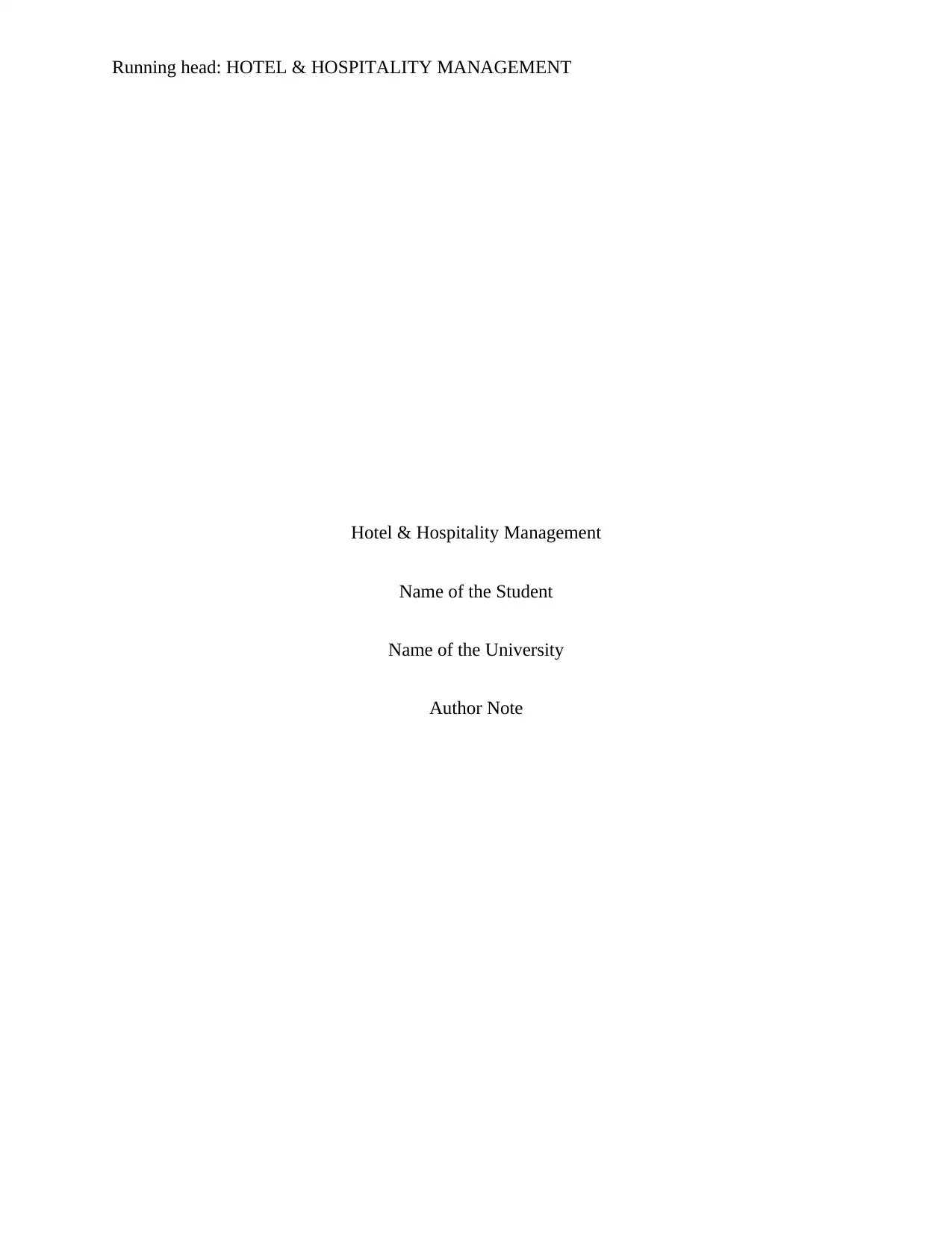
Running head: HOTEL & HOSPITALITY MANAGEMENT
Hotel & Hospitality Management
Name of the Student
Name of the University
Author Note
Hotel & Hospitality Management
Name of the Student
Name of the University
Author Note
Paraphrase This Document
Need a fresh take? Get an instant paraphrase of this document with our AI Paraphraser
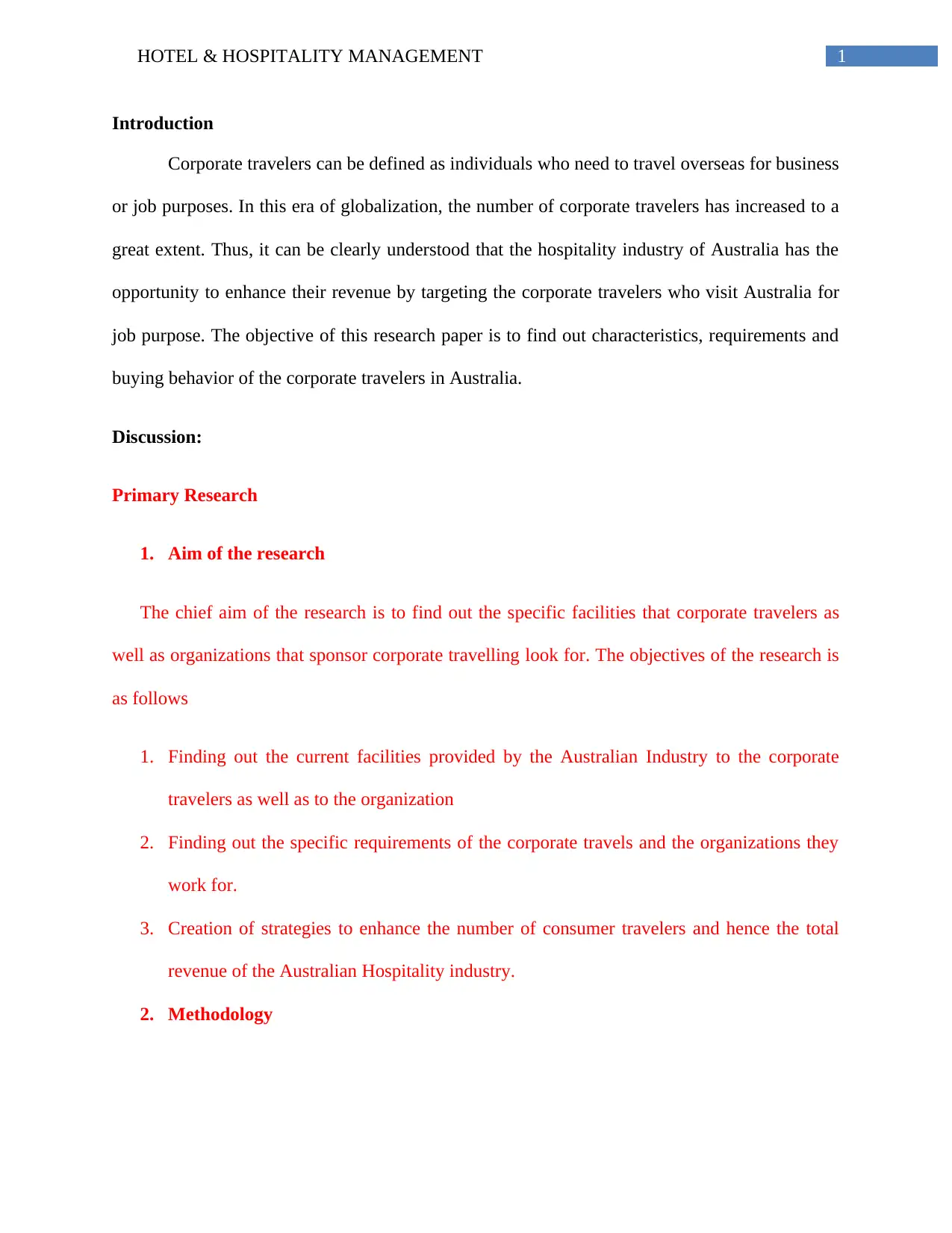
1HOTEL & HOSPITALITY MANAGEMENT
Introduction
Corporate travelers can be defined as individuals who need to travel overseas for business
or job purposes. In this era of globalization, the number of corporate travelers has increased to a
great extent. Thus, it can be clearly understood that the hospitality industry of Australia has the
opportunity to enhance their revenue by targeting the corporate travelers who visit Australia for
job purpose. The objective of this research paper is to find out characteristics, requirements and
buying behavior of the corporate travelers in Australia.
Discussion:
Primary Research
1. Aim of the research
The chief aim of the research is to find out the specific facilities that corporate travelers as
well as organizations that sponsor corporate travelling look for. The objectives of the research is
as follows
1. Finding out the current facilities provided by the Australian Industry to the corporate
travelers as well as to the organization
2. Finding out the specific requirements of the corporate travels and the organizations they
work for.
3. Creation of strategies to enhance the number of consumer travelers and hence the total
revenue of the Australian Hospitality industry.
2. Methodology
Introduction
Corporate travelers can be defined as individuals who need to travel overseas for business
or job purposes. In this era of globalization, the number of corporate travelers has increased to a
great extent. Thus, it can be clearly understood that the hospitality industry of Australia has the
opportunity to enhance their revenue by targeting the corporate travelers who visit Australia for
job purpose. The objective of this research paper is to find out characteristics, requirements and
buying behavior of the corporate travelers in Australia.
Discussion:
Primary Research
1. Aim of the research
The chief aim of the research is to find out the specific facilities that corporate travelers as
well as organizations that sponsor corporate travelling look for. The objectives of the research is
as follows
1. Finding out the current facilities provided by the Australian Industry to the corporate
travelers as well as to the organization
2. Finding out the specific requirements of the corporate travels and the organizations they
work for.
3. Creation of strategies to enhance the number of consumer travelers and hence the total
revenue of the Australian Hospitality industry.
2. Methodology
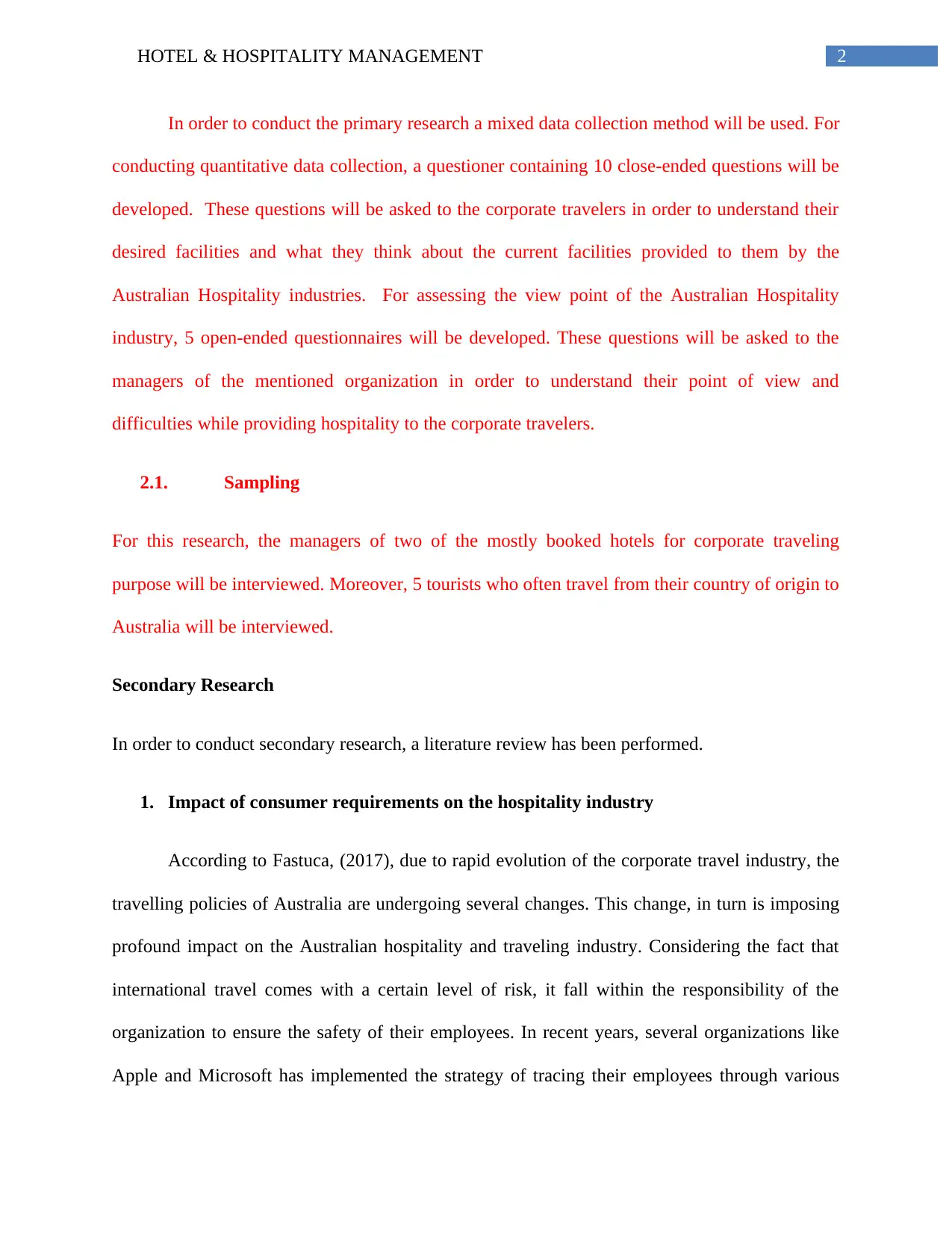
2HOTEL & HOSPITALITY MANAGEMENT
In order to conduct the primary research a mixed data collection method will be used. For
conducting quantitative data collection, a questioner containing 10 close-ended questions will be
developed. These questions will be asked to the corporate travelers in order to understand their
desired facilities and what they think about the current facilities provided to them by the
Australian Hospitality industries. For assessing the view point of the Australian Hospitality
industry, 5 open-ended questionnaires will be developed. These questions will be asked to the
managers of the mentioned organization in order to understand their point of view and
difficulties while providing hospitality to the corporate travelers.
2.1. Sampling
For this research, the managers of two of the mostly booked hotels for corporate traveling
purpose will be interviewed. Moreover, 5 tourists who often travel from their country of origin to
Australia will be interviewed.
Secondary Research
In order to conduct secondary research, a literature review has been performed.
1. Impact of consumer requirements on the hospitality industry
According to Fastuca, (2017), due to rapid evolution of the corporate travel industry, the
travelling policies of Australia are undergoing several changes. This change, in turn is imposing
profound impact on the Australian hospitality and traveling industry. Considering the fact that
international travel comes with a certain level of risk, it fall within the responsibility of the
organization to ensure the safety of their employees. In recent years, several organizations like
Apple and Microsoft has implemented the strategy of tracing their employees through various
In order to conduct the primary research a mixed data collection method will be used. For
conducting quantitative data collection, a questioner containing 10 close-ended questions will be
developed. These questions will be asked to the corporate travelers in order to understand their
desired facilities and what they think about the current facilities provided to them by the
Australian Hospitality industries. For assessing the view point of the Australian Hospitality
industry, 5 open-ended questionnaires will be developed. These questions will be asked to the
managers of the mentioned organization in order to understand their point of view and
difficulties while providing hospitality to the corporate travelers.
2.1. Sampling
For this research, the managers of two of the mostly booked hotels for corporate traveling
purpose will be interviewed. Moreover, 5 tourists who often travel from their country of origin to
Australia will be interviewed.
Secondary Research
In order to conduct secondary research, a literature review has been performed.
1. Impact of consumer requirements on the hospitality industry
According to Fastuca, (2017), due to rapid evolution of the corporate travel industry, the
travelling policies of Australia are undergoing several changes. This change, in turn is imposing
profound impact on the Australian hospitality and traveling industry. Considering the fact that
international travel comes with a certain level of risk, it fall within the responsibility of the
organization to ensure the safety of their employees. In recent years, several organizations like
Apple and Microsoft has implemented the strategy of tracing their employees through various
⊘ This is a preview!⊘
Do you want full access?
Subscribe today to unlock all pages.

Trusted by 1+ million students worldwide
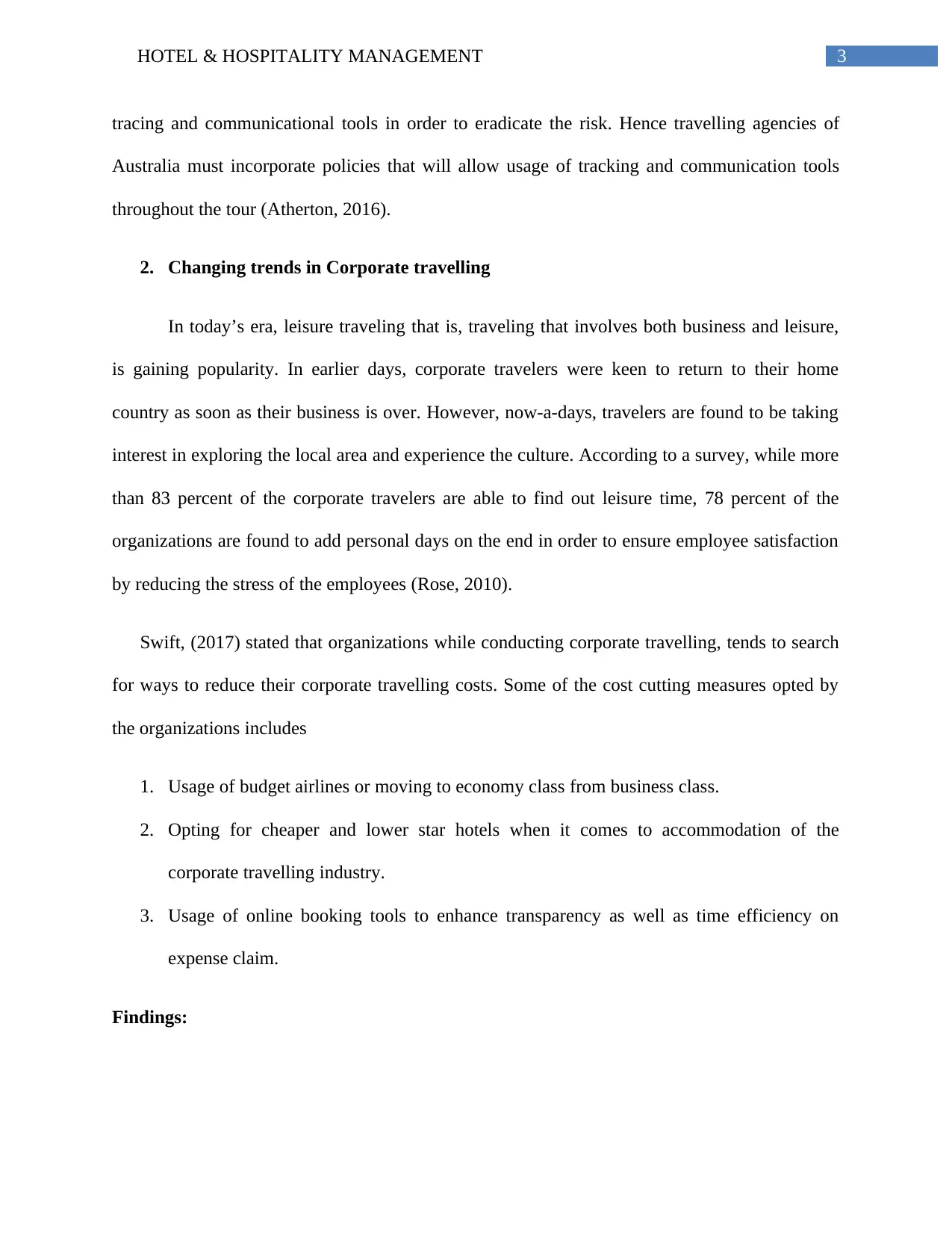
3HOTEL & HOSPITALITY MANAGEMENT
tracing and communicational tools in order to eradicate the risk. Hence travelling agencies of
Australia must incorporate policies that will allow usage of tracking and communication tools
throughout the tour (Atherton, 2016).
2. Changing trends in Corporate travelling
In today’s era, leisure traveling that is, traveling that involves both business and leisure,
is gaining popularity. In earlier days, corporate travelers were keen to return to their home
country as soon as their business is over. However, now-a-days, travelers are found to be taking
interest in exploring the local area and experience the culture. According to a survey, while more
than 83 percent of the corporate travelers are able to find out leisure time, 78 percent of the
organizations are found to add personal days on the end in order to ensure employee satisfaction
by reducing the stress of the employees (Rose, 2010).
Swift, (2017) stated that organizations while conducting corporate travelling, tends to search
for ways to reduce their corporate travelling costs. Some of the cost cutting measures opted by
the organizations includes
1. Usage of budget airlines or moving to economy class from business class.
2. Opting for cheaper and lower star hotels when it comes to accommodation of the
corporate travelling industry.
3. Usage of online booking tools to enhance transparency as well as time efficiency on
expense claim.
Findings:
tracing and communicational tools in order to eradicate the risk. Hence travelling agencies of
Australia must incorporate policies that will allow usage of tracking and communication tools
throughout the tour (Atherton, 2016).
2. Changing trends in Corporate travelling
In today’s era, leisure traveling that is, traveling that involves both business and leisure,
is gaining popularity. In earlier days, corporate travelers were keen to return to their home
country as soon as their business is over. However, now-a-days, travelers are found to be taking
interest in exploring the local area and experience the culture. According to a survey, while more
than 83 percent of the corporate travelers are able to find out leisure time, 78 percent of the
organizations are found to add personal days on the end in order to ensure employee satisfaction
by reducing the stress of the employees (Rose, 2010).
Swift, (2017) stated that organizations while conducting corporate travelling, tends to search
for ways to reduce their corporate travelling costs. Some of the cost cutting measures opted by
the organizations includes
1. Usage of budget airlines or moving to economy class from business class.
2. Opting for cheaper and lower star hotels when it comes to accommodation of the
corporate travelling industry.
3. Usage of online booking tools to enhance transparency as well as time efficiency on
expense claim.
Findings:
Paraphrase This Document
Need a fresh take? Get an instant paraphrase of this document with our AI Paraphraser
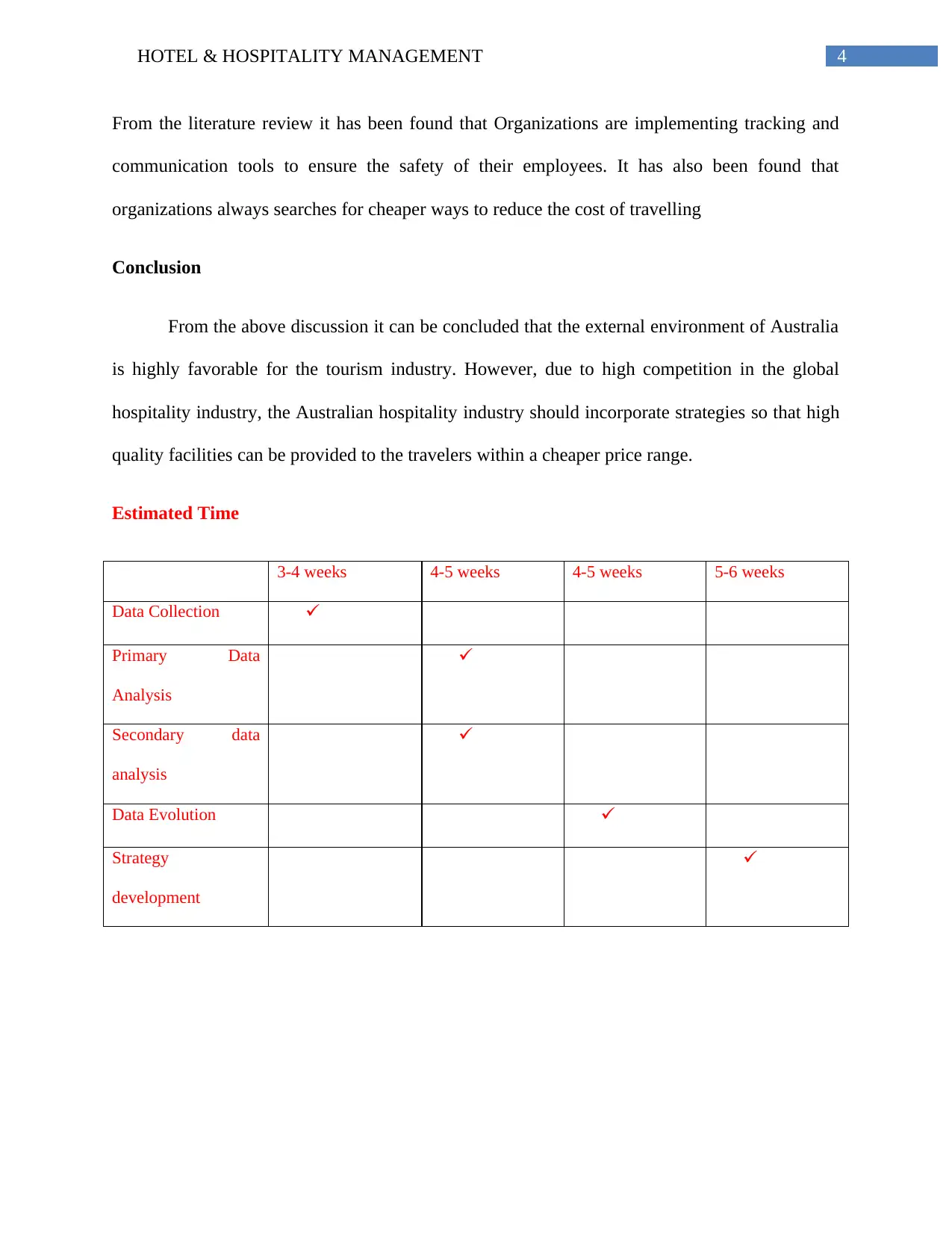
4HOTEL & HOSPITALITY MANAGEMENT
From the literature review it has been found that Organizations are implementing tracking and
communication tools to ensure the safety of their employees. It has also been found that
organizations always searches for cheaper ways to reduce the cost of travelling
Conclusion
From the above discussion it can be concluded that the external environment of Australia
is highly favorable for the tourism industry. However, due to high competition in the global
hospitality industry, the Australian hospitality industry should incorporate strategies so that high
quality facilities can be provided to the travelers within a cheaper price range.
Estimated Time
3-4 weeks 4-5 weeks 4-5 weeks 5-6 weeks
Data Collection
Primary Data
Analysis
Secondary data
analysis
Data Evolution
Strategy
development
From the literature review it has been found that Organizations are implementing tracking and
communication tools to ensure the safety of their employees. It has also been found that
organizations always searches for cheaper ways to reduce the cost of travelling
Conclusion
From the above discussion it can be concluded that the external environment of Australia
is highly favorable for the tourism industry. However, due to high competition in the global
hospitality industry, the Australian hospitality industry should incorporate strategies so that high
quality facilities can be provided to the travelers within a cheaper price range.
Estimated Time
3-4 weeks 4-5 weeks 4-5 weeks 5-6 weeks
Data Collection
Primary Data
Analysis
Secondary data
analysis
Data Evolution
Strategy
development
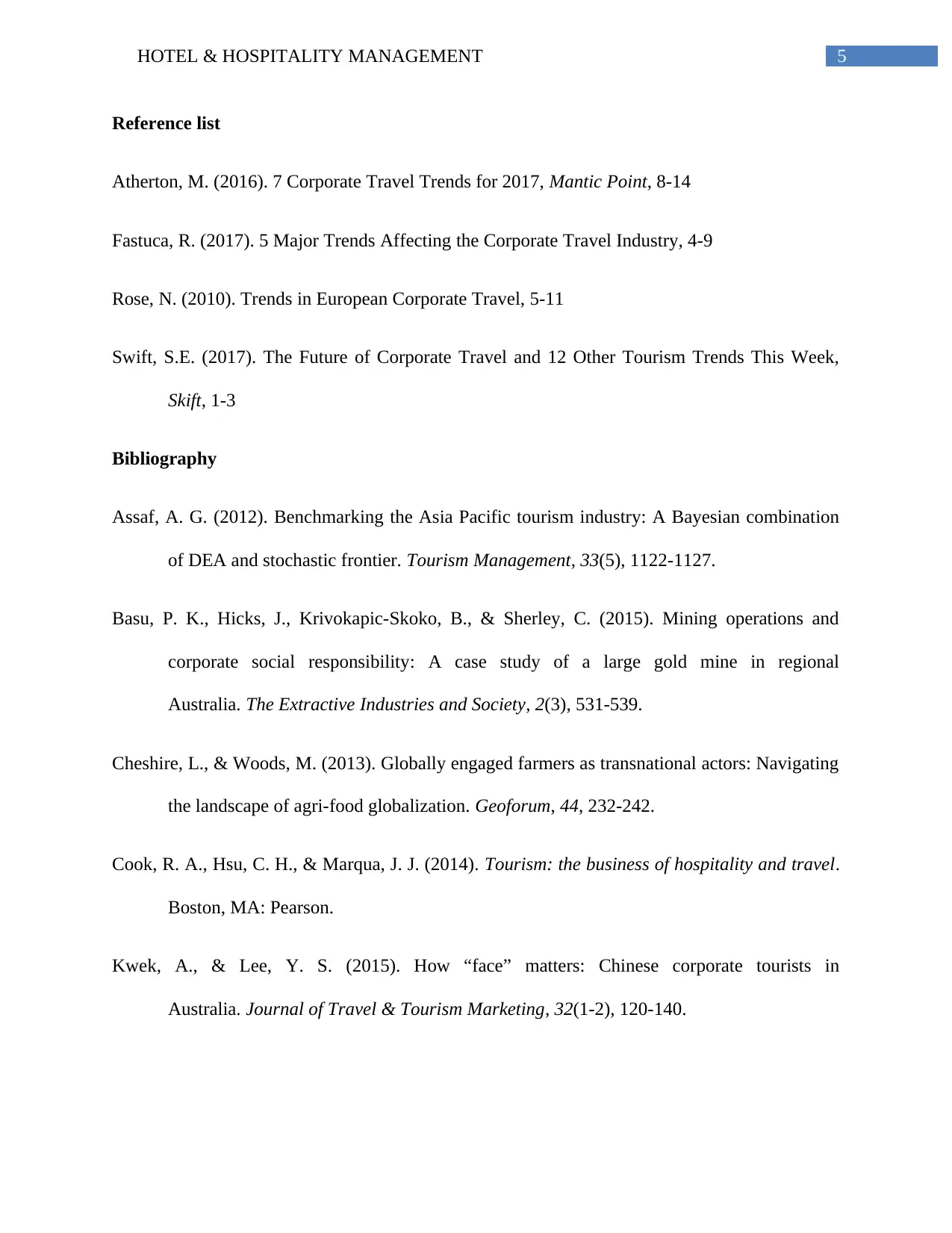
5HOTEL & HOSPITALITY MANAGEMENT
Reference list
Atherton, M. (2016). 7 Corporate Travel Trends for 2017, Mantic Point, 8-14
Fastuca, R. (2017). 5 Major Trends Affecting the Corporate Travel Industry, 4-9
Rose, N. (2010). Trends in European Corporate Travel, 5-11
Swift, S.E. (2017). The Future of Corporate Travel and 12 Other Tourism Trends This Week,
Skift, 1-3
Bibliography
Assaf, A. G. (2012). Benchmarking the Asia Pacific tourism industry: A Bayesian combination
of DEA and stochastic frontier. Tourism Management, 33(5), 1122-1127.
Basu, P. K., Hicks, J., Krivokapic-Skoko, B., & Sherley, C. (2015). Mining operations and
corporate social responsibility: A case study of a large gold mine in regional
Australia. The Extractive Industries and Society, 2(3), 531-539.
Cheshire, L., & Woods, M. (2013). Globally engaged farmers as transnational actors: Navigating
the landscape of agri-food globalization. Geoforum, 44, 232-242.
Cook, R. A., Hsu, C. H., & Marqua, J. J. (2014). Tourism: the business of hospitality and travel.
Boston, MA: Pearson.
Kwek, A., & Lee, Y. S. (2015). How “face” matters: Chinese corporate tourists in
Australia. Journal of Travel & Tourism Marketing, 32(1-2), 120-140.
Reference list
Atherton, M. (2016). 7 Corporate Travel Trends for 2017, Mantic Point, 8-14
Fastuca, R. (2017). 5 Major Trends Affecting the Corporate Travel Industry, 4-9
Rose, N. (2010). Trends in European Corporate Travel, 5-11
Swift, S.E. (2017). The Future of Corporate Travel and 12 Other Tourism Trends This Week,
Skift, 1-3
Bibliography
Assaf, A. G. (2012). Benchmarking the Asia Pacific tourism industry: A Bayesian combination
of DEA and stochastic frontier. Tourism Management, 33(5), 1122-1127.
Basu, P. K., Hicks, J., Krivokapic-Skoko, B., & Sherley, C. (2015). Mining operations and
corporate social responsibility: A case study of a large gold mine in regional
Australia. The Extractive Industries and Society, 2(3), 531-539.
Cheshire, L., & Woods, M. (2013). Globally engaged farmers as transnational actors: Navigating
the landscape of agri-food globalization. Geoforum, 44, 232-242.
Cook, R. A., Hsu, C. H., & Marqua, J. J. (2014). Tourism: the business of hospitality and travel.
Boston, MA: Pearson.
Kwek, A., & Lee, Y. S. (2015). How “face” matters: Chinese corporate tourists in
Australia. Journal of Travel & Tourism Marketing, 32(1-2), 120-140.
⊘ This is a preview!⊘
Do you want full access?
Subscribe today to unlock all pages.

Trusted by 1+ million students worldwide
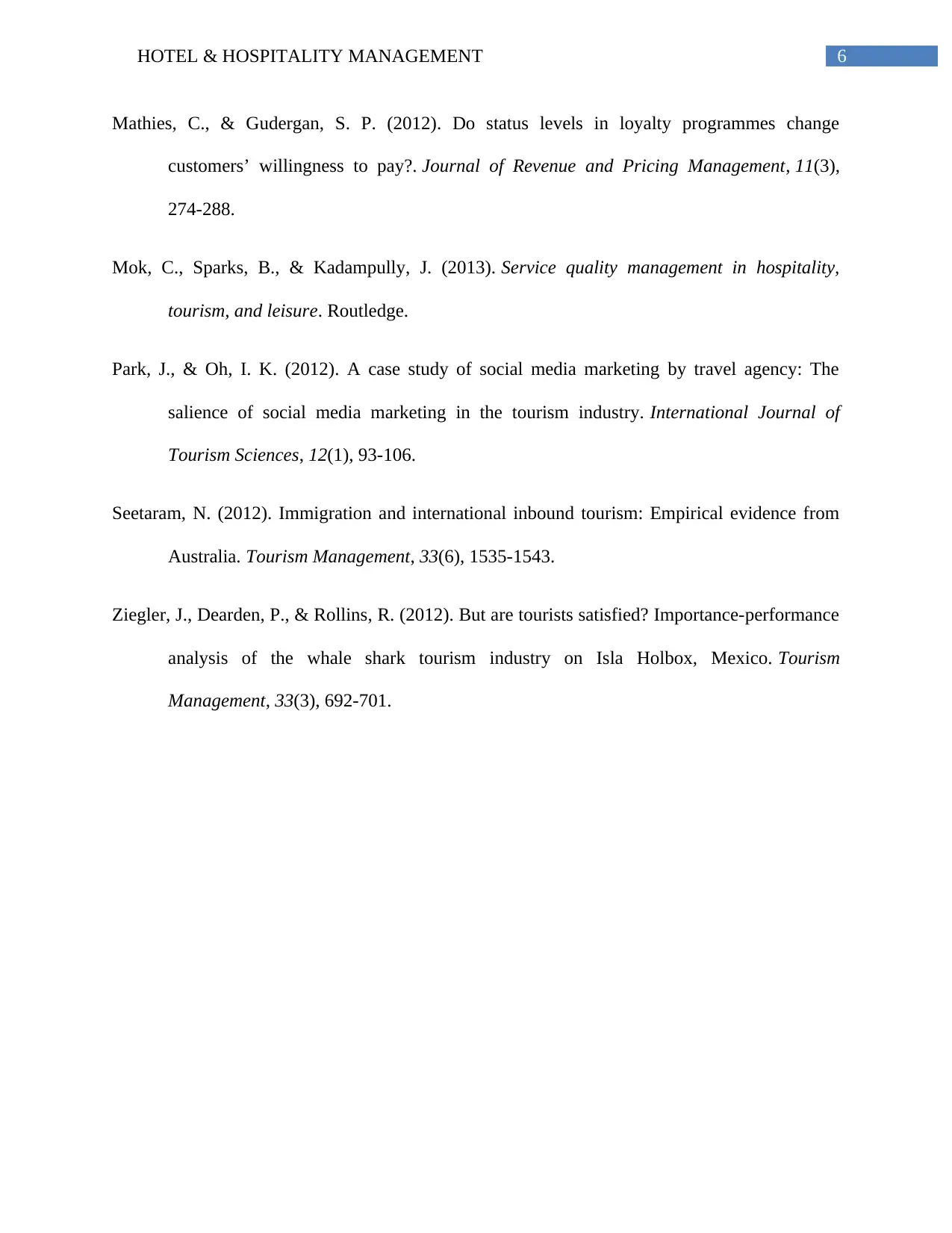
6HOTEL & HOSPITALITY MANAGEMENT
Mathies, C., & Gudergan, S. P. (2012). Do status levels in loyalty programmes change
customers’ willingness to pay?. Journal of Revenue and Pricing Management, 11(3),
274-288.
Mok, C., Sparks, B., & Kadampully, J. (2013). Service quality management in hospitality,
tourism, and leisure. Routledge.
Park, J., & Oh, I. K. (2012). A case study of social media marketing by travel agency: The
salience of social media marketing in the tourism industry. International Journal of
Tourism Sciences, 12(1), 93-106.
Seetaram, N. (2012). Immigration and international inbound tourism: Empirical evidence from
Australia. Tourism Management, 33(6), 1535-1543.
Ziegler, J., Dearden, P., & Rollins, R. (2012). But are tourists satisfied? Importance-performance
analysis of the whale shark tourism industry on Isla Holbox, Mexico. Tourism
Management, 33(3), 692-701.
Mathies, C., & Gudergan, S. P. (2012). Do status levels in loyalty programmes change
customers’ willingness to pay?. Journal of Revenue and Pricing Management, 11(3),
274-288.
Mok, C., Sparks, B., & Kadampully, J. (2013). Service quality management in hospitality,
tourism, and leisure. Routledge.
Park, J., & Oh, I. K. (2012). A case study of social media marketing by travel agency: The
salience of social media marketing in the tourism industry. International Journal of
Tourism Sciences, 12(1), 93-106.
Seetaram, N. (2012). Immigration and international inbound tourism: Empirical evidence from
Australia. Tourism Management, 33(6), 1535-1543.
Ziegler, J., Dearden, P., & Rollins, R. (2012). But are tourists satisfied? Importance-performance
analysis of the whale shark tourism industry on Isla Holbox, Mexico. Tourism
Management, 33(3), 692-701.
1 out of 7
Related Documents
Your All-in-One AI-Powered Toolkit for Academic Success.
+13062052269
info@desklib.com
Available 24*7 on WhatsApp / Email
![[object Object]](/_next/static/media/star-bottom.7253800d.svg)
Unlock your academic potential
Copyright © 2020–2025 A2Z Services. All Rights Reserved. Developed and managed by ZUCOL.





